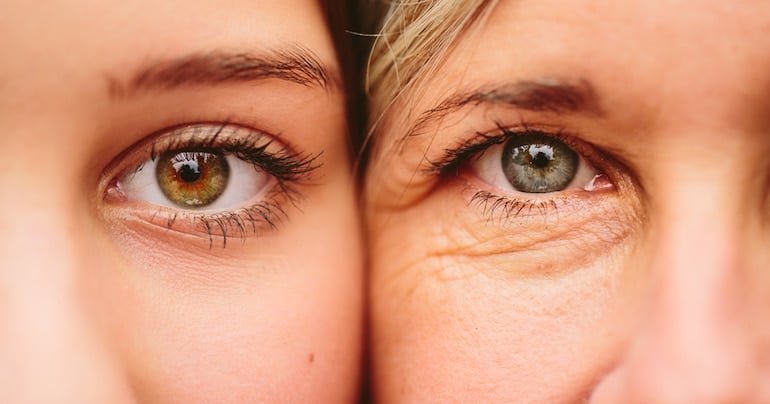What Are Free Radicals and Why Are They Bad?
Carrie Gabriel, MS, RDN, investigates exactly why free radicals are bad for your health. Plus: three ways to reduce them in the body to support long-term wellness.
While our bodies do a pretty good job of dealing with everyday sources of pollution and other toxins, pesky free radicals can steadily contribute to long-term side effects. But what are they exactly, and what do they do to the body?
Here’s everything you need to know about how to protect yourself from free radical damage.
What Are Free Radicals?
Free radicals are unstable molecules that can damage the cells in your body. They often occur as a result of normal metabolic processes, as well as environmental stressors.
The body loses its ability to combat their effects as we age. This results in more free radicals, cell damage, and oxidative stress. (Oxidative stress is an imbalance between their production and the body’s ability to neutralize/detoxify resulting damage.)
Exposure and resulting damage leads to degenerative processes in the body, including aging.

the Free Radical theory of aging
According to the free radical theory of aging, free radicals break down cells over time.
Numerous studies support this relatively new theory. There have been studies on rats showing significant increases in free radicals as the rats aged, which match up with age-related declines in the health of humans.
This research suggests that free radicals produced in the mitochondria—the powerhouse of our cells—damage the substances that the cell needs to work properly. This damage causes mutations that produce more free radicals, thus accelerating damage to the cell.
This theory helps explain aging, since aging accelerates over time. It offers one explanation on why healthy bodies age and deteriorate as years pass.

Why are Free radicals bad?
In addition to premature aging, numerous undesired issues are associated with the accumulation of free radicals in the body. Side effects include skin, digestion, and mental health issues.
Skin Damage
When it comes to our skin, free radicals cause direct damage to our skin’s DNA, which results in accelerated skin aging. Cell damage may appear in several forms on your skin, including:
- premature wrinkles
- unwanted pigmentation
- uneven skin tone
- dull skin
Over time, these side effects on your skin can grow to be more noticeable. It’s also worth noting that UV rays are the primary contributors to free radicals in skin, providing yet another good reason to apply SPF daily.
Digestive Issues
Free radicals in foods can disrupt digestion. Oxidative stress is greater when you consume specific types of foods, which can be influenced by the way in which they’re prepared or cooked.
In addition to the free radicals we create naturally through digestion, the biggest dietary culprits of free radicals include fried foods and alcohol.
Mental Health Concerns
Free radicals play a major role in several mental health disorders by altering fats, proteins, and DNA.
For instance, because the brain is a fat-rich environment, it’s highly receptive to oxidative stress and imbalances. For that reason, it can easily be damaged or compromised.
sources of free radicals
We encounter free radicals daily through different means. Here are some of their major sources of formation.
Free Radicals in the Body
As previously mentioned, our bodies create these unstable molecules through normal, essential metabolic processes. For instance, when your body uses oxygen, it creates free radicals as a byproduct and results in oxidative stress.
Also, we can create them as we eat and digest food. It’s also worth noting that overeating further increases free radical production. As we eat more, our cells release more activated oxygen than normal, thus generating higher levels of free radicals.

Free radicals in Food
Then, free radicals are found within certain foods themselves, namely:
- fried foods
- refined carbohydrates
- sugars + sweets
- alcohol
Additionally, foods with preservatives like sausage, bacon, and salami produce more free radicals. Red meat is a notable free radical generator because it has high iron content, which makes it vulnerable to oxidation.
environmental Exposure
Finally, there are many environmental sources that produce free radicals, including exposure to:
- air pollutants
- cigarette smoke
- pesticides
- UV rays
- ozone
- industrial chemicals
How to reduce free radicals in the body
Some level of oxidative stress is inevitable. However, there are easy, natural ways to reduce free radicals in the body and stave off oxidative stress.

Eat Antioxidant-Rich Foods
Antioxidants—healthful compounds in fruits, vegetables, and healthy fats—can help by neutralizing free radicals.
Foods that pack beta-carotene, lycopene, and lutein particularly aid in free radical reduction. These include:
- tomatoes
- corn
- Brussels sprouts
- carrots
- collard greens
- apples
- mangoes
- blackberries
- raspberries
- strawberries
Additionally, other antioxidant foods with more than one vitamin include spinach, beets, red bell peppers, figs, blueberries, and dark chocolate.
Exercise Regularly
Secondly, studies show that regular exercise alleviates the negative effects of cell damage. Of course, exercise also offers countless overall health benefits, ranging from a reduced risk of mortality causes to a better mood and weight management.
Take the Right Supplements
Last but not least, antioxidants such as vitamins A, C and E, selenium, and certain phytonutrients and polyphenols all help neutralize free radicals. For a daily insurance policy against cell damage, HUM’s Air Patrol can help meet your antioxidant needs.
The post What Are Free Radicals and Why Are They Bad? appeared first on HUM Nutrition Blog.
Original source: https://www.humnutrition.com/blog/why-are-free-radicals-bad/
Comments
Post a Comment